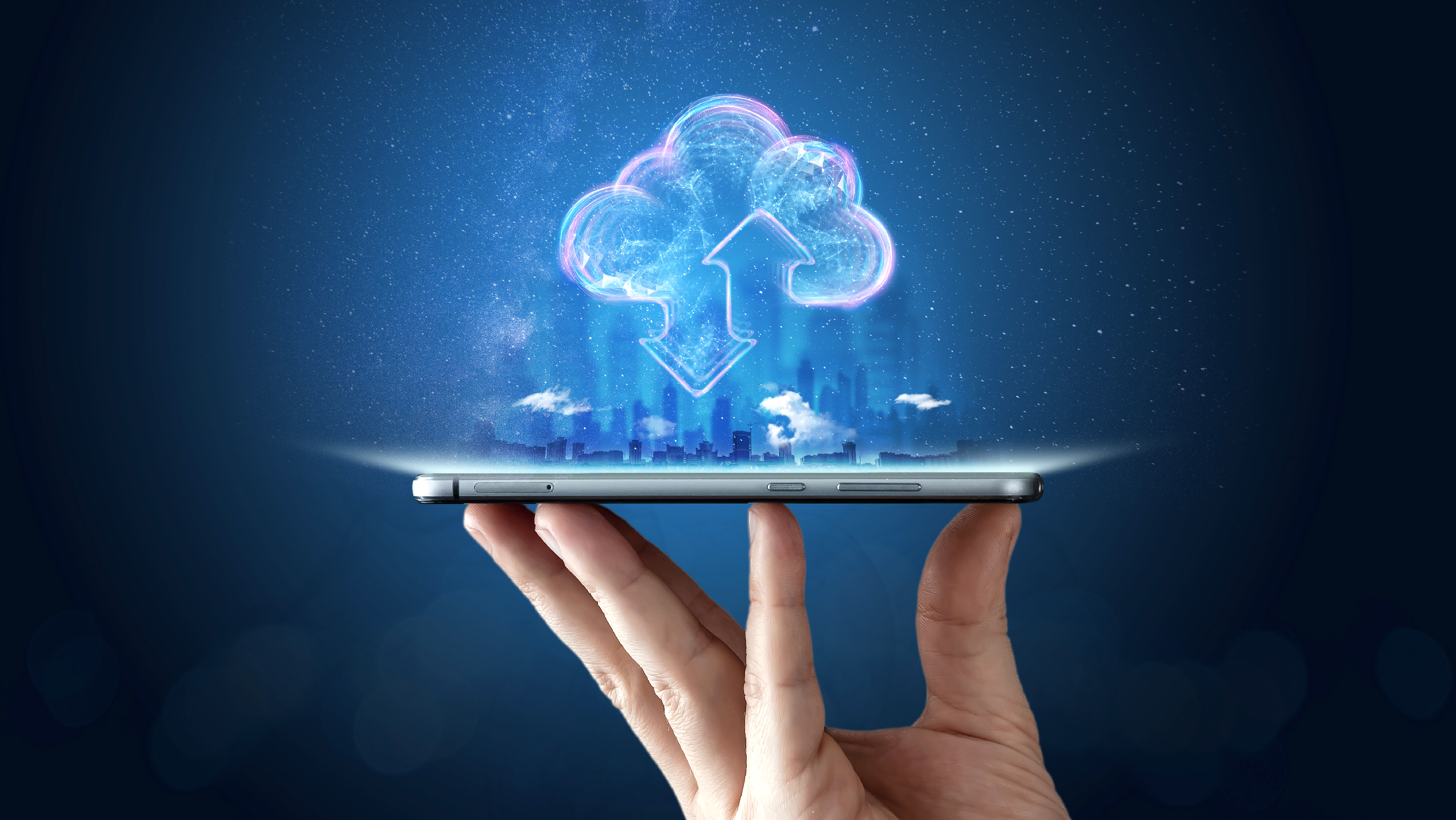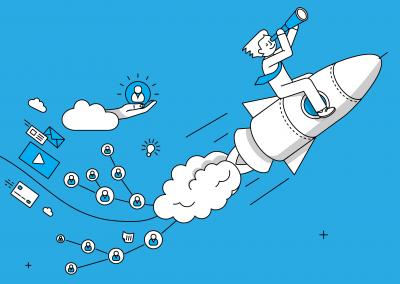We use cookies to make your experience better. To comply with the new e-Privacy directive, we need to ask for your consent to set the cookies. Learn more.
The Future is DIGITAL! So, How Will it Change the World?

Innovation and digitisation are fast becoming the survival kit, pushing industries to stay agile, adaptive, and empathetic. The rise of an ‘intelligent enterprise’ which is equipped to deal with and pivot under any scenario, thereby becomes inevitable. In this article, Kulmeet Bawa, President and MD, SAP Indian Subcontinent, elucidates on what will fuel this journey and how current trends like AI, IoT, and more significantly Cloud computing would become synonymous with digital reengineering, thus bolstering businesses of the future.
There is only one thing that is inevitable and constant—and that is change. We live in an age where technology is transforming enterprises, societies, and everything in between. In the past decade, digital transformation has gained significance in every industry and enterprises everywhere strive to digitise their core processes to perform better in a dynamic business environment.
From the Cloud and artificial intelligence to Blockchain and Big Data and the Internet of Things (IoT), digital technologies are redefining how we live and work. They are expanding the purview of the potential in terms of new products, services, business models, and the internal processes that facilitate these new offerings.
I am a believer of life-lessons, and my tenure with Indian Army has offered immense learning in navigating through challenges. One of those has been preparing for contingencies while strategising the operations. It is very similar and relevant in today's environment as well. The past year brought to light this change more than ever with businesses propelling digital transformation to the top of the priority list as a long-term investment. It has become imperative for businesses to adapt and act fast—pivoting processes and operations to survive and build resilience for a sustainable future ahead. The only way forward is how well humans and machines harmonise with each other to propagate more innovative, agile, and adaptable economies and enterprises.
Today, enterprises must reimagine their future and get on board intelligent digital re-engineering. Each of the factors that facilitate and empower the re-engineering journey must be observed and integrated to create a workforce of the future.
The Future of Consumer Technology
The future of the human-technology interface is reliant on the fact that every business—whether it is hospitality, education, logistics, food & beverage, personal care, and myriad others—is a technology business. Digital touchpoints are being inserted at every step of the customer journey from awareness to realisation to advocacy. Interactive kiosks, radio-frequency identification tags, virtual reality simulations, and computer vision are examples of how immersive human-technology interactions are in business-to-customer (B2C) models. However, the distant digital brand experience will not continue to be the only norm. In the next 18 to 24 months, we will witness in-person and digital experiences to be more intertwined than ever before. Customer journeys will constitute offline transactions with integrated digital elements to elevate brand experience and hyper-personalisation. A more digital world, therefore, must be coupled with a more connected and networked society.
Cloud Has Become the Cornerstone of Agility
From a business point-of-view, businesses need to focus on ‘total experience’ and ‘internet of behaviours’. The total experience is aligning technology with all stakeholders; customers, employees, and suppliers to build intelligent enterprises—thus, solving complex business problems through optimised human experiences. Cloud computing provides the foundation for enterprises to be intelligent, to retrieve data from all back and front operating systems and then generate predictive analytics and effective decision making. The data looks at business transactions to understand what is happening and helps us to know why something is happening by capturing human sentiment. 2021 and onwards is going to witness modernising legacy systems and migrating them to the Cloud to unleash organisations’ digital potency. Gaining real-time insights on equipment to reduce maintenance costs, using IoT and predictive analysis to recognise weather patterns and minimise energy costs, AI in the deployment of bots that understand humans or proactively supporting healthcare through tele-health applications are examples of how businesses and Cloud technologies will continue to evolve and innovate together.
Cloud as a Catalyst to Innovate and Scale up
The use of Cloud is now accepted as mainstream, creating new opportunities for customers, workforce and the ecosystem, catalysing major changes in traditional IT offerings. It makes an ideal alternative as it can let enterprises scale up or down depending on the health of the business, save organisations' capital, reducing the time to market.
Today, Cloud is more than just scalable infrastructure—it is a catalyst for business growth, innovation or even reinvention. When enterprises become agile by adopting applications in the Cloud, they are able to cater to their priorities, or share information on real time basis and reimagine how value is being created. Across all business sizes or even industries, it brings together everything an enterprise needs to reimagine—data, people, partners, processes, and technology on one streamlined platform.
At SAP too, through our solutions and service portfolio, we enable organisations of all sizes across 25 industries to operate efficiently, adapt continuously and achieve their set goals. One of the recent examples is Adani Wilmar who were looking to increase operational efficiency and accelerate digital innovation. They deployed SAP S/4HANA and SAP HANA Enterprise Cloud to automate their entire business process. With SAP, they were able to get value driven results with better inventory management and better quality control, thus allowing them to innovate more rapidly.
Similarly, Stalwart Technik Pvt Ltd, a leading manufacturer that was looking for an end-to-end digital platform to help them automate their processes and become future-ready, adopted SAP to help them replace their manual systems and improve overall efficiency. It helped them increase effective utilisation of resources by 75% and enabled faster decision making across business operations.
Rise of the Intelligent Enterprise
An intelligent enterprise can adapt and fundamentally re-assemble itself based on a current and future situation. As organisations accelerate business strategy to drive faster digital transformation, they need to be agile and make quick business decisions based on intelligence from the available data.
An intelligent enterprise can run integrated processes across every part of the business to make informed decisions, automate processes and deliver the experiences that customers and employees expect. Having an open business technology platform to embed analytics and support data management and integration is vital for business operations to run smoothly. The case for becoming an intelligent enterprise has never been stronger. The supply chain shocks and dislocations caused by the pandemic showed us that it is not enough for businesses to be internally intelligent. Companies must be able to listen, understand and act on signals from outside their four walls. Businesses need to be able to operate in a network economy. By connecting to other organisations within their value chain, where they can exchange data, collaborate on business processes, and transact more seamlessly with one another.
Intelligent Enterprises and Cloud Computing Trends to Watch out for
Cloud computing, which bolstered the world’s economy, global supply chains and remote working models, will continue to remain indispensable for organisations that are looking for increased scalability, business continuity and cost effectiveness in 2021 and beyond.
Some prominent trends that are critical today are the impact of 5G, Edge, Blockchain Computing and IoT as key enablers for Industry 4.0. With very low latency, peak data rates of up to 20Gbit/s, higher density of devices, higher mobility, and higher energy efficiency, 5G will impact the adoption of IoT and applications based on mobile machinery. Additionally, Blockchain will help address trust issues in increasingly dynamic business partner ecosystems, including the trading of contracts, the extended supply chain, finance, sustainability, and health.
An area to watch out going forward is becoming a sustainable intelligent enterprise, one who can earn customer loyalty, attract investment capital, retain engaged employees, and gain reputational goodwill. For instance, with our technology, SAP provides the foundation for holistic steering and sustainability reporting, as well as solutions that address the urgent need for climate action, transformation to a circular economy, and socially responsible value chains.
What Lies Ahead
In a world of seemingly infinite unknowns, enterprises are establishing programs that can effectively identify, evaluate, and incubate digitisation to transform themselves. By doing so, they are also creating new opportunities and harnessing advanced technologies to chart a path to the next horizon.
The future will not just be about technology. It will come with the incubation of technology, purpose and balance that drives people growth and business strategies. Business leaders are placing big bets on intelligent environments and bringing a whole new level of sophistication to the physical world. Hence, it is imperative to go beyond the hype of new technologies and discover how they are shaping our future.
SAP’s Commitment to Innovation
At SAP, we aspire to partner and innovate with our customers to enable them on their growth trajectory. In India, where the technology landscape is changing rapidly and newer technologies are being introduced, Unicorns and Digital Natives are becoming the preferred breed. With its unique solutions and offerings, SAP is strongly positioned to drive technology entrepreneurship in India with a focus on early or growth stage startups that use disruptive technology to solve business challenges.
With more than 9500 mid-market customers in India, our success stems from the ability to nurture, educate and grow an ecosystem to meet the country’s needs by helping them embrace digitisation, focus on upskilling their workforce and enhancing overall business value.





